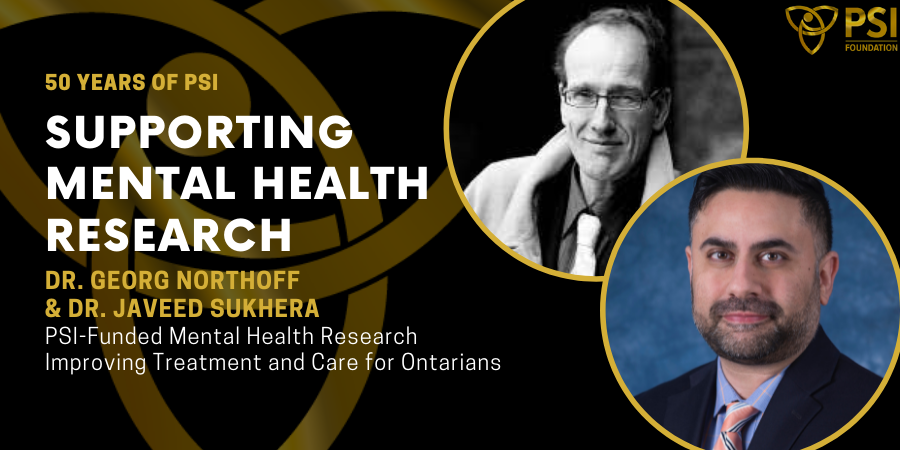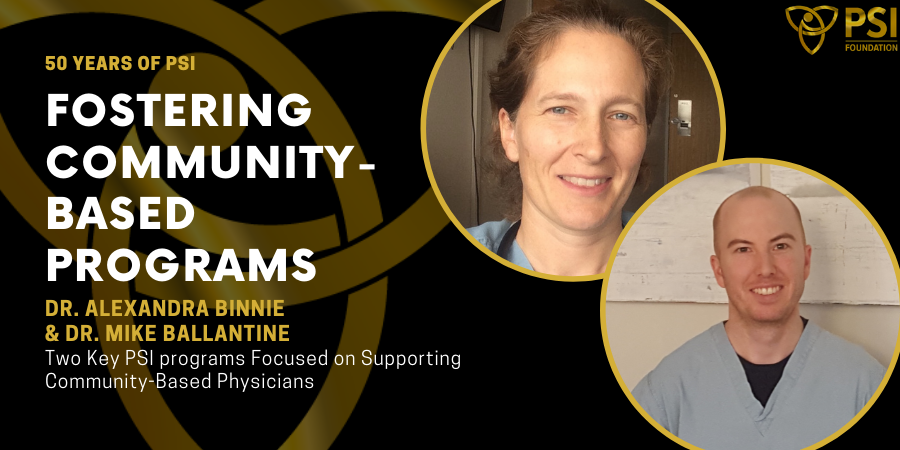Research funded by PSI Foundation is tackling diverse challenges in mental health, ranging from examining the neural networks underlying mental illness to finding ways to reduce stigma in the health care system.
For much of its 50-year history, PSI Foundation did not fund mental health research. But after extensive consultation with internal and external stakeholders, including the PSI Board of Directors and leaders at Ontario’s medical schools, it began funding mental health research in 2016 through a dedicated stream of operating grants. The change recognizes the strong link between physical and mental health.
“The body, mind and brain are very closely connected. It’s like dancing a good tango,” says Dr. Georg Northoff, a neuroscientist and psychiatrist at the University of Ottawa Institute of Mental Health Research, citing the close connection between cardiac activity and psychological function as one example. “If you are struggling with mental health, you often don’t feel physically well either.”
Dr. Northoff received one of the first PSI Mental Health Research Grants in 2016 to investigate whether brain imaging can help improve diagnosis and treatment of bipolar disorder, schizophrenia and major depressive disorder (MDD). These three disorders can be difficult to distinguish from each other based only on symptoms, but the treatments are quite different.
With his PSI grant, he and his team used fMRI and electroencephalography (EEG) to study neural network activity and imbalances in the brains of people with these mental illnesses. A better understanding of brain activity will help develop diagnostic markers and may even improve treatment through stimulating specific brain regions.
They identified that some patients with MDD have slower-than-usual activity in the visual cortex of the brain, resulting in blurry perception and slowed behaviour. Using this finding, they evaluated whether stimulating this region of the brain is an effective treatment for MDD. They intended to stimulate other relevant brain regions to treat the other illnesses, but the study was interrupted by the COVID-19 pandemic; however, early results from patients with MDD were promising and will be explored in further studies.
Dr. Northoff says that the PSI funding supported the groundwork of the study and may ultimately improve treatment for depression.
“We really want to make treatment more individualized. We could use the imaging and whether they have blurry perception or slow behaviour to determine the exact region of the brain and frequency at which we need to stimulate,” he says. “That’s a real result of the PSI funding.”
New PSI research award examines stigma in health care system
In 2019, PSI incorporated the mental health funding stream into its regular operating grants. However, to commemorate PSI’s 50th anniversary and re-affirm its dedication to mental health research, it awarded two Mental Health Knowledge Translation Fellowships, one-time $300,000 awards to support new clinician-scientists conducting mental health research and protect 50% of their time for research.
Dr. Javeed Sukhera, a psychiatrist at London Health Sciences Centre and Associate Professor in the Departments of Psychiatry and Pediatrics at Western University, received one of the fellowships to examine structural stigma toward mental illness in health care and medical education.
While implicit stigma is reflected in individuals’ attitudes and behaviours toward people with mental illness, structural stigma is embedded in organizations through policies, practices and cultural norms. And it can greatly impact health, especially in populations who are already vulnerable and marginalized in health care.
“We know that stigma is a form of prejudice and discrimination that is directly linked with poor health outcomes. It leads patients to mistrust health care providers, adhere less to health care recommendations and seek help less, and it is even empirically linked with suicide,” says Dr. Sukhera. “Knowing that stigma interferes with patient outcomes and wellbeing, I felt compelled to look at effective ways to tackle it within the system.”
With the PSI fellowship, Dr. Sukhera is examining how stigma influences a patient’s experience in the health care system, as well as analyzing social media conversations about mental illness and stigma to learn how medical students and residents learn about these topics. Based on those findings, he and his team will develop a digital toolkit that will not only help health care professionals provide better patient care, but will also empower patients and caregivers with knowledge and skills to address stigma and seek help. Dr. Sukhera says that knowledge translation and mobilization are key in making change to policies and procedures at health care institutions.
“It’s not just knowledge to practice, it’s knowledge to action – in terms of education, policy and advocacy,” he says. “That’s the kind of meaningful change that our research can actually produce if we are intentional about mobilizing it.”
Dr. Sukhera appreciates that PSI has recognized mental health research and its influence on health care and health care providers by including the field in its areas of support.
“Mental health touches every aspect of care, not just for patients but also for physicians and health professionals who are struggling and affected by the same challenges in the health care system,” he says. “By deconstructing the stigma that exists in the system, we have a chance to start building something better.”




